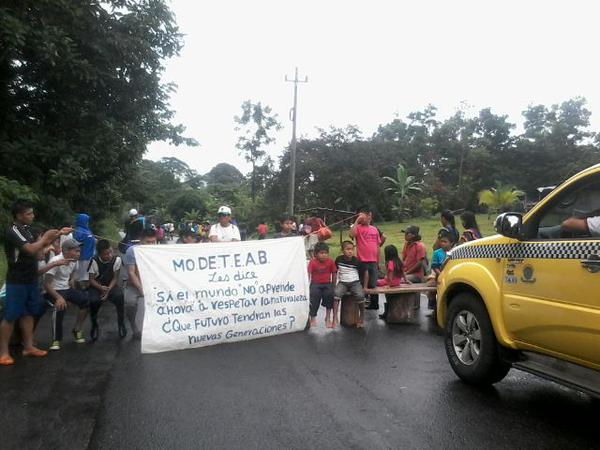The Democrats at the Iowa State Fair
Hillary Clinton
Bernie Sanders
Jim Webb
Martin O’Malley
Lincoln Chafee
 ¿Wappin? Songs for those heady days of hope and confrontation
¿Wappin? Songs for those heady days of hope and confrontation
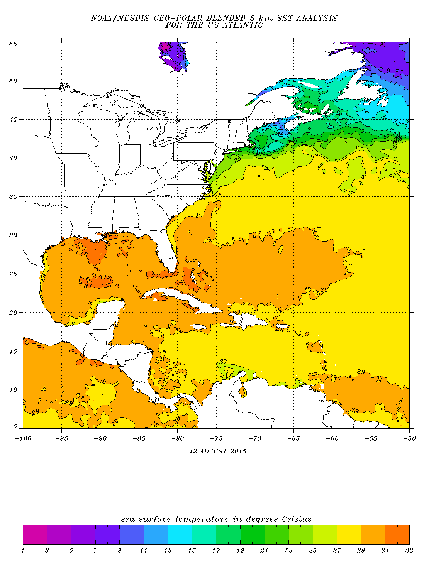
Video, I-Nesta — ¿De qué sirve una bala?
The FCPA Blog, SAP exec in USA pleads guilty to bribing Martinelli administration
Pan-Am Post, Panama to investigate Martinelli in Hacking Team spy scandal
Gandásegui, El ‘círculo cero’ de la corrupción y de los negocios
Blouin News, Panamax 2015 maneuvers
JOC, Suez expansion and Panama restrictions won’t impact trade — for now
Footwear News, Will PanCanal draft restrictions affect shoe companies?
O’Grady, China wants to dig the Nicaragua canal
MarineLink.com, China to dig the Nicaragua canal with a change in layout
Gulf News, Emirates to fly world’s longest route to Panama
Goal.com, Seattle Sounders sign Roman Torres
The Guardian, Costa Rica coach Paulo Wanchope quits after Panama fisticuffs
Video, Surf With Amigas goes to Panama
IPS, Papa Francisco se une a la batalla contra los transgénicos
Ehrlich & Ehrlich, How humans cause mass extinctions
The Guardian, Stores in Europe take glyphosate off their shelves
AP, Panama’s weird octopus species
Mongabay, Drones against wildlife poaching
Hsu, China’s clean energy plans
STRATFOR, Russia is destroying its food
Carlsen, Hunted down in Mexico for speaking out
Nation of Change, Reporters face charges in Ferguson
Greenwald, Democrats delude themselves about Gitmo
Consortium News, Gauging the violent “Fox Effect”
Abu-Jamal, Trump and the politics of resentment
Rolling Stone: Bern, baby, Bern!
Castro, Puerto Rico: Estado poco libre, asociado y… en bancarrota
El País, Latinoamérica teme por la devaluación de China
EFE, Panamá reduce déficit de sector público no financiero
SouthNews, UN committee adopts principles for sovereign debt restructuring
History Channel, Six disastrous economic bubbles
Prensa Latina, Panamá elabora su inventario de patrimonio cultural inmaterial
BankTrack, The dodgy banks of Barro Colorado
Jazz Corner, Berklee brings music therapy and jazz workshops to Panama
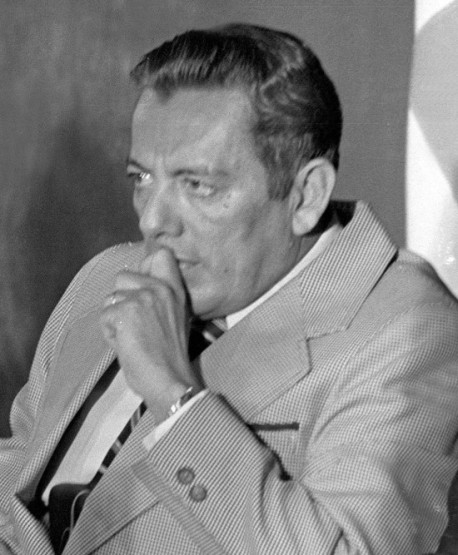 Fundamentos para un nuevo pacto político
Fundamentos para un nuevo pacto políticoLos resultados de las elecciones de mayo de 2014, colocaron al PRD ante una derrota sin precedentes lo que obligó de forma responsable a algunos grupos, dirigentes históricos y corrientes vigentes dentro del colectivo, a iniciar procesos de debate, construcción de acuerdos y acciones, que coincidiesen en el propósito de viabilizar la regeneración revolucionaria y democrática del Partido, el realineamiento con los principios, doctrina y prácticas que le dieron origen y sustento, de cara a generar una propuesta renovada y conducente a la reconquista de la confianza de las mayorías nacionales, en un contexto diferente.
Surge así hace más de un año, la Coordinadora Nacional Pro Rescate Torrijista del PRD, como plataforma colaborativa y mesa de debate horizontal y propositiva, facilitadora de convergencias de diversas agrupaciones de copartidarios, que bajo el criterio de respeto a la autonomía, independencia e identidad de cada corriente, promoviera la dimensión ética de la acción política, la reestructuración de la dirección del Partido, la recuperación de un discurso político coherente y la reivindicación e innovación de nuestra visión ideológico-programática (Torrijista y Socialdemócrata).
En el marco de este esfuerzo de coincidencias y motivados por la realidad que vive el PRD y sus perspectivas, luego de la reunión del Directorio Nacional el pasado 12 de julio, hemos convenido lo siguiente:
Desde esta puntualización, debemos impulsar hacia el X Congreso:
Su esfuerzo en equipo, debe promover:
Para dar continuidad a este proceso, la Coordinación iniciará los contactos que sean necesarios para lograr la adhesión a esta propuesta amplia e integradora, convocará una gran “asamblea de corrientes Torrijistas” para validar los contenidos del nuevo pacto político interno y designará por consenso una comisión de garantes.
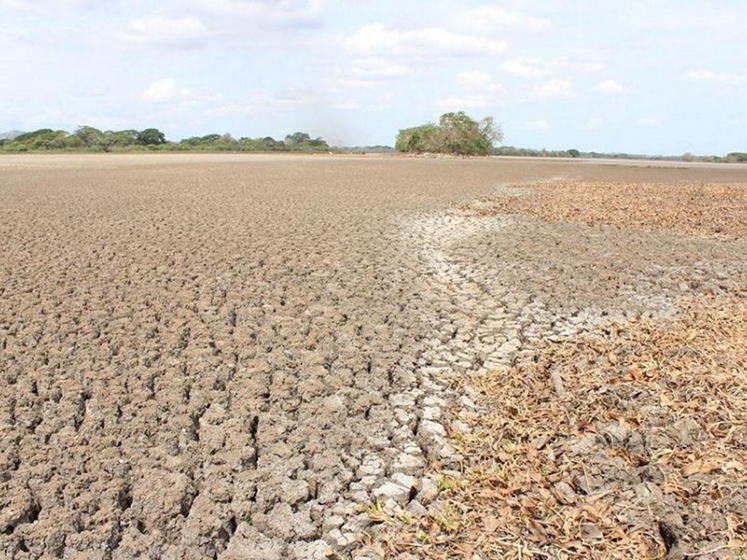
Panama has people in academia and in the Ministry of Environment who chart, study and predict the weather and climate, but the most systematic monitoring and projections come from two semi-autonomous public entities with vital interests in rainfall, the Panama Canal Authority and the ETESA power line company. Both of these predict the present El Niño condition continuing into next year, with ETESA projecting that the drought will not let up until the middle of 2016. That’s another year of drought.
In light of that the 60-day state of emergency contains a reasonable set of steps, but why are we not imposing electricity saving measures, as we know that the reservoirs behind the hydroelectric dams are bound to be affected? And the new wells and mini-reservoirs in the Azuero — for how long would they solve many problems there?
The climate is changing, but this drought will end. Sooner or later we will get another one. Meanwhile sea levels will rise — we don’t know how far or how fast, but this has been happening for a number of years now. We need to adapt, and to be ready to adapt even more. This painful but temporary emergency is a good occasion for the nation to discuss what’s happening and likely to happen, and to make some decisions.
We start without a genuine public energy policy. What we have is a corporate energy policy ratified by the government — and let’s not call it a “free market” policy because it has major anti-competitive features like high taxes for imported solar panels and windmills, and a ban on marketing household-generated electricity on the grid. One of the salient features of the Barro Blanco dispute is the insistence of a thuggish Honduran family enterprise on the private appropriation of the Tabasara River without compensation to those who would be driven away by the loss of the water resources upon which they have depended for ages. Whether the question is interconnections with other countries’ power grids or the modernization of our own, private interests always seem to trump public ones, and the private interests of the wealthiest companies always seem to get priority over the private interests of smaller enterprises.
Panama also doesn’t have a water policy to speak of. Ricardo Martinelli and his band of thieves wanted a water privatization scheme and it drew so much opposition that it was withdrawn. But in times of climate change the rejection of a policy we didn’t want does not equal a policy that we do need. Especially so, now that Juan Carlos Varela was elected largely on a promise to provide running water and indoor plumbing for every household. To do that requires expansion and interconnection of aqueduct systems, new water sources and new water conservation policies all designed to be flexible if conditions change.
Zoning, drainage and public infrastructures for low-lying areas — above all for Panama City — need to be rethought now as sea levels slowly rise. Responding to the demands of the richest people to save their waterfront investments would be no proper way to set policy. Neither would a search to house people of more modest means who were living in safe areas that turned into flood plains. Failure to think ahead, followed by a scramble to replace wells into which saltwater has seeped, should not be an option.
Yes, it’s boring and many of those who would volunteer for the job would also have ulterior economic motives that conflict with Panama’s national interests. But Panama needs to think past this drought to the next one and the one after that.
Who leads in latest polling for the New Hampshire primary? On the Democratic side it’s Bernie Sanders, with Republicans it’s Donald Trump. It’s early yet.
Trump carries an awful lot of baggage and it seems that every other time he opens his mouth he creates more. Does a large GOP constituency just love his sexist insults of Fox News’s Megyn Kelly? Maybe that’s a primary bonus among Republicans, but surely it’s a problem with the female majority of general election voters. He is similarly alienating African-American voters — few of whom will vote Republican — and the various Hispanic groups, of which anyone who wants to be president of the United States needs the votes of at least a substantial minority. If he survives the piranha attacks of his primary rivals and gets the nomination, look for a weakened Republican ticket losing more than just the White House. If he loses the nomination and runs as an independent, look for a terrible rout for both Trump and the GOP.
But WAIT! Bernie Sanders is a socialist! Won’t the 1956 Cold War majority re-emerge and send him to political oblivion? That zombie forecast is not particularly the math of Republicans who think that Joe McCarthy was really cool, but of Hillary Clinton and the corporate Democrats. They have a ton of money to make the case and it looks like the neo-conservatives may switch back to the Democratic side this time to support Hillary. As the neo-cons recently argued in the National Review, Bernie Sanders — whose extended family was largely massacred in the Holocaust — is a “national-socialist,” that is, a Nazi, because he is for certain aspects of economic nationalism like investing in the USA and controlling immigration so as not to allow an influx of cheap labor and at the same time a democratic socialist who believes in quality public education, free university tuition, socialized medicine and economic safety nets like those that prevail across Northern Europe. Plus, say some neo-cons, Sanders is a self-hating Jew because he’s unimpressed with Mr. Netanyahu and opposed to a war with Iran.
The American electorate is weary with old dynasties, “free trade” dogma that extols economic globalization on terms dictated by corporations, ruinously expensive US wars all over the world and contrived racial, ethnic and religious strife. The moderates chasing after the extremes may have found the winning primary formula. Those coming from what used to be called the fringes who say modest things but uphold certain bedrock principles are the ones whom you find in the biggest campaign season crowds.

Government and PanCanal meteorologists predict that we won’t get much rain, especially on the Pacific Side, until the heavy seasonal rains come in October and November. Those annual cloudbursts, they expect, will end early and we will get into a more severe El Niño dry season that will stretch into next year. Many farms and communities have lost their water sources or are about to, the Panama Canal has imposed draft restrictions and our ability to generate electricity at the nation’s hydroelectric dams is threatened.
Thus the cabinet has decreed a 60-day state of emergency that should get us to the October rains, after which new measures may be announced. In the meantime, there is no watering of lawns or gardens with potable water allowed — wastewater is allowed for such purposes — and the government will be issuing no new irrigation permits. Existing fire permits are also suspended, to prevent the bomberos from having to use precious water supplies to put out fires that get out of control.
At the same press conference at which Environment Minister Mirei Endara announced the new measures, Security Minister Rodolfo Aguilera announced that police would be less tolerant of road blockages, moving in with clubs and tear gas more quickly than has been the practice. This policy is without regard to the cause of the particular protest, but with the drought and consequent breakdowns in many water systems we are seeing a lot more traffic disruptions over water outages than is normally the case at this time of the year.
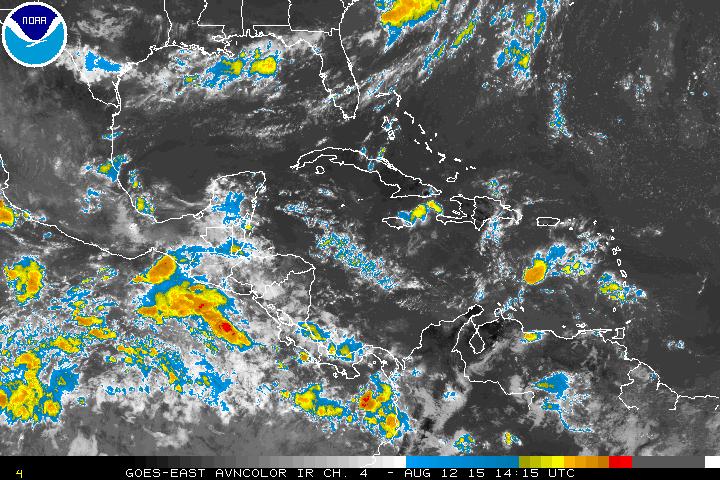
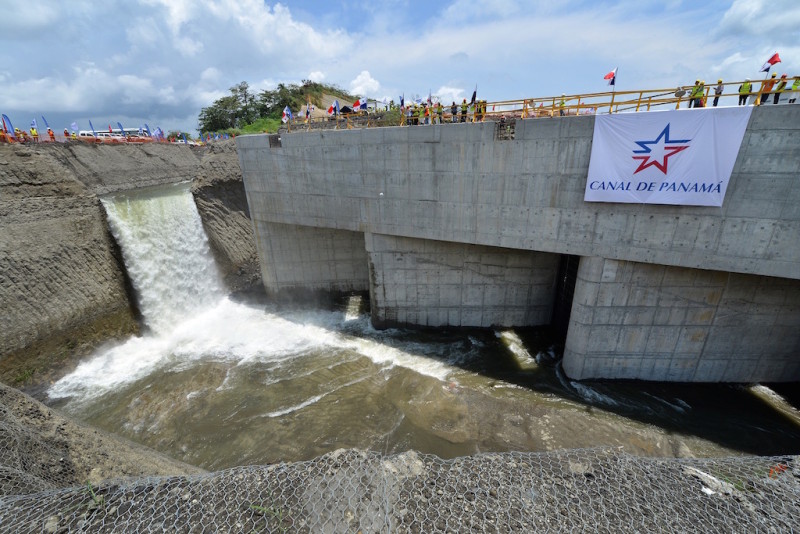
On the afternoon of August 11 two ballooning problems for the Panama Canal Authority (ACP)deflated. First, it was announced that talks between the GUPC consortium that’s building the new locks and the SUNTRACS construction workers’ union had come to enough of an agreement that the union suspended its call for an August 12 walkout. Later, Minister of Canal Affairs Roberto Roy, citing a call by anti-corruption czarina Angélica Maytín for action to suspend or remove ACP board member Nicolás Corcione and general provisions of the code of ethics for Panama Canal Authority employees, announced that Corcione’s colleagues on the board would address the matter.
Under their contract the workers were owed pay raises on July 1, which GUPC had not paid. The agreement give canal expansion construction workers their raise, retroactive to July 1. GUPC complains that the ACP ought to pay for the raise but PanCanal administrator Jorge Luis Quijano rejects that, warning that the pay issue is between the contractor and the union. The implicit threat is that if GUPC provokes a strike that delays the project’s completion — again — the consortium won’t get any relief from the late delivery penalties that are part of its contract with the ACP. A sub-text of what’s going on is that the previous canal administration improperly accepted an unrealistic lowball bid from GUPC, as is the norm with such schemes to contractor is trying to add extra charges to the bill to make up the difference on its low bid but the new administrator is unwilling to play that game.
Corcione is accused of coordinating bribery, kickback and money laundering scheme for construction and renovation work on the nation’s courts, with the ultimate beneficiaries jailed former presiding Supreme Court magistrate Alejandro Moncada Luna and former Vice President Felipe Virzi (who is under house arrest) and Corcione taking a payment of at least $200,000 for his role. Testimony from others involved in the scheme and a money trail though Banco Universal, which the government has taken from the Virzi family and has put up for sale, points to Corcione. But he claims that as a member of the ACP board of directors he is immune from being investigated or prosecuted by ordinary prosecutors. That claim is widely reject, now including by Administrative Prosecutor Rigoberto González Montenegro, who opines that membership on the ACP board of directors is not an administrative post calling for special procedures against a person in that position.
Roy didn’t set a time for the ACP board to meet about Corcione, but he told La Prensa that this is not a long term issue. Roy’s imprecision about when the meeting will happen my be to allow a race among several possible events — Corcione’s arrest, Corcione’s resignation from the board or Corcione’s flight — to take its course.
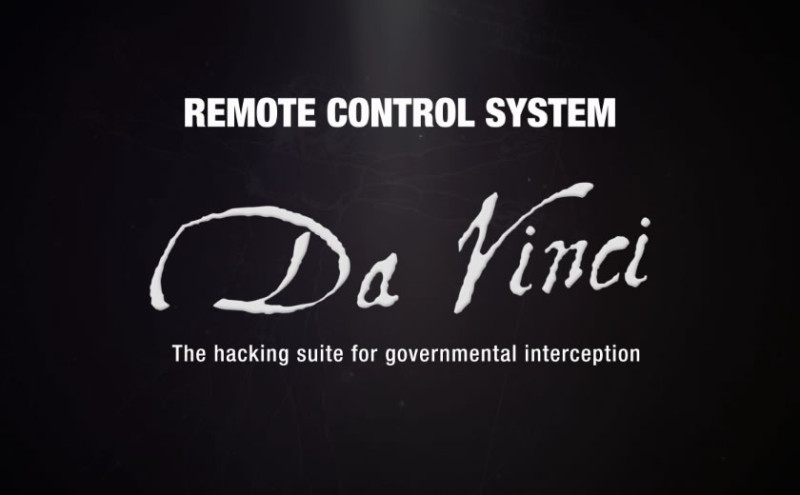
It would be interesting to know what top police commanders and US diplomats told Ricardo Martinelli in the final weeks before the May 2014 elections. The former president had stolen hundreds of millions of dollars from the public treasury — some directly, some by overpriced contracts with kickbacks to the Cambio Democratico campaign — to shower gifts on voters. The police had stockpiled huge arsenals of anti-riot munitions. Virtually all online media that Martinelli did not control had been hacked. Every appearance was that whatever the voters said, the former president intended to hold onto power through his proxy slate. It would seem that somebody with superior power to bring to bear warned him to desist.
But maybe not. There was also a Plan B in motion. The Martinelli administration and the legislature it controlled had passed laws to make it difficult to prosecute themselves for crimes that they had committed. One of these was the addition to the Code of Criminal Procedure that limits the time for prosecutors to carry out an investigation against someone with legislative immunity to two months from the time the investigation starts. If formal charges are not brought within that brief window of time, then the case must be closed and the matters it addresses may not be brought up by the criminal justice system again. As a former president, Martinelli became a member of the Central American Parliament and would be covered by this privilege.
However, Panama’s often ignored constitution says a few high-minded things about equality before the law. Article 19, for example, prohibits privileges, immunities or discrimination on the basis of social class. So is Ricardo Martinelli’s self-protection amendment to the rules of criminal procedure the creation of a social class with special privileges and immunities?
The second of several criminal cases against Martinelli to get to the Supreme Court is about illegal electronic eavesdropping. It’s a difficult case because key figures have gone into hiding, the equipment used has gone missing, foreign contractors have clammed up and the basic facts of what happened were hidden under veils of “national security” at the time. But two former national security directors are under arrest and talking, charges have been requested against a third, audits have uncovered money trails and international hackers have hacked into the data of one the key foreign contractors, Italy’s private company Hacking Team, and published those data. The Public Ministry has been investigating people without legislative immunity all along, and much of what they find either implicates Martinelli or gives leads to other sources that are likely to do so.
So on July 2 there was a hearing in Martinelli’s eavesdropping case, with defense counsel seeking to prolong matters so as to run out the time for an investigation. But the high court’s prosecutor in the matter, magistrate Oydén Ortega, filed a constitutional motion challenging the special time limit. That stopped the countdown and most of the proceedings against Martinelli, save the previous motion in the Electoral Tribunal to lift the former president’s immunity.
While that freeze was in place, more facts about the surveillance program became known. It turns out that there were at least four major contracts involved, three for electronic equipment and one for software. It turns out that some of the hardware was bought through a company owned by the ex-president’s brother-in-law, Aaron Mizrachi. When that connection became public knowledge through reports in La Prensa, Mizrachi went to Albrook airport and took off in Martinelli’s private jet for Miami, where like the ex-president he is now in self-imposed and us-tolerated exile.
On August 10 the Electoral Tribnal rejected a motion for reconsideration of its order lifting Martinelli’s immunity. So when the full Supreme Court rules on the challenge to the shorter time for investigations legislators — in another case, not on Ortega’s motion — will Ortega have just 60 days to investigate if the rule is upheld? In effect, he’s already had a month and a half more than that.
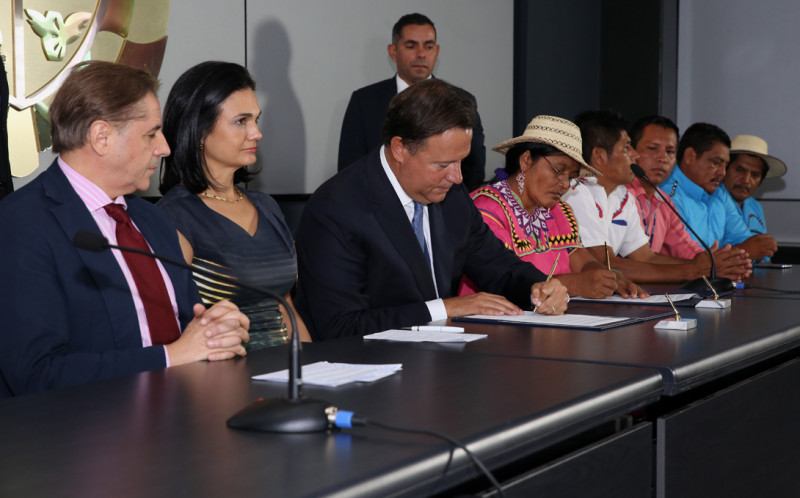
On August 10, one faction of indigenous opponents of the Barro Blanco Dam vowed to close the Bridge of the Americas. The riot squad showed up but the protesters didn’t. Meanwhile another group blocked a road in Bocas del Toro. The main action, however, was at the presidential palace. There the general cacique of the Ngabe-Bugle Comarca, Silvia Carrera, and the president of Panama, Juan Carlos Varela, signed a truce that doesn’t really settle the most controversial issues — some of them are not even mentioned — but does seem to buy time in a situation that was headed for a major confrontation.
The agreement that was signed allows for the completion of construction of the dam itself, as the government urges that the failure to to this creates a risk of changing the course of the river and flooding downstream communities. However, the closing of the gates to flood the area behind the dam will not happen unless there is a new agreement to allow that. A joint government and indigenous technical commission will study the questions of the unfinished power plant and bridge abutments. Work on the generators is stopped unless and until there is another agreement that would allow it to resume. Talks will continue with United Nations moderation and will broach the subject of the dam’s ultimate ownership, with the possibility of a buyout of the project’s developer GENISA specifically raised.
GENISA is denouncing the agreement, which was made in its absence ane mentions no direct role for it in future talks. Some Ngabe militants have also expressed opposition or skepticism. The most important of Silvia Carrera’s intra-Ngabe rivals, Mama Tata leader Clementina Pérez, has yet to state a position on the agreement. GENISA had intended to inundate some ancient petroglyphs along the Tabasara River’s banks, a monument that the Mama Tata religion considers holy. The agreement puts off any immediate threat of that.
